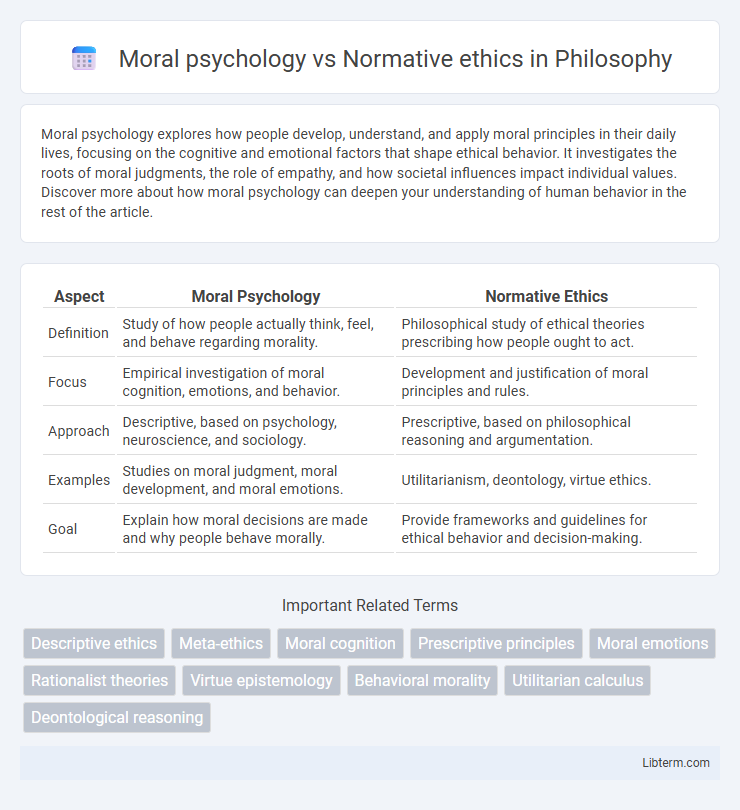Moral psychology explores how people develop, understand, and apply moral principles in their daily lives, focusing on the cognitive and emotional factors that shape ethical behavior. It investigates the roots of moral judgments, the role of empathy, and how societal influences impact individual values. Discover more about how moral psychology can deepen your understanding of human behavior in the rest of the article.
Table of Comparison
| Aspect | Moral Psychology | Normative Ethics |
|---|---|---|
| Definition | Study of how people actually think, feel, and behave regarding morality. | Philosophical study of ethical theories prescribing how people ought to act. |
| Focus | Empirical investigation of moral cognition, emotions, and behavior. | Development and justification of moral principles and rules. |
| Approach | Descriptive, based on psychology, neuroscience, and sociology. | Prescriptive, based on philosophical reasoning and argumentation. |
| Examples | Studies on moral judgment, moral development, and moral emotions. | Utilitarianism, deontology, virtue ethics. |
| Goal | Explain how moral decisions are made and why people behave morally. | Provide frameworks and guidelines for ethical behavior and decision-making. |
Introduction to Moral Psychology and Normative Ethics
Moral psychology explores how people actually think, feel, and behave regarding moral issues, analyzing cognitive processes, emotions, and social influences that shape moral judgments. Normative ethics, in contrast, prescribes how individuals ought to act by establishing moral standards and principles, such as utilitarianism, deontology, and virtue ethics. Understanding both fields provides insight into the descriptive aspects of moral behavior and the prescriptive frameworks designed to guide ethical decision-making.
Defining Moral Psychology: Focus and Methods
Moral psychology investigates how individuals perceive, process, and enact moral beliefs through empirical methods such as cognitive experiments, neuroimaging, and behavioral studies. It focuses on descriptive analysis of moral cognition, emotions, and development rather than prescribing ethical standards. By examining phenomena like moral judgment, decision-making, and social influences, moral psychology provides insights into the psychological foundations behind ethical behavior.
Understanding Normative Ethics: Principles and Theories
Normative ethics explores foundational principles and theories that guide moral judgments, including consequentialism, deontology, and virtue ethics. It establishes criteria for determining right and wrong actions, emphasizing ethical duties, outcomes, and character traits. Understanding these frameworks helps clarify moral reasoning beyond descriptive observations found in moral psychology.
Historical Development of Both Fields
Moral psychology traces its roots to ancient philosophy with Aristotle's exploration of character and virtue, evolving through the 19th and 20th centuries alongside psychology's rise as a scientific discipline. Normative ethics, grounded in classical philosophy with contributions from Plato, Kant, and Mill, developed systematic theories such as deontology, utilitarianism, and virtue ethics to prescribe moral duties and values. Both fields expanded significantly during the Enlightenment, with moral psychology increasingly emphasizing empirical study, while normative ethics focused on formalizing moral principles and frameworks.
Key Questions: Descriptive vs. Prescriptive Approaches
Moral psychology examines how people actually think, feel, and behave regarding ethical issues, focusing on descriptive questions about human moral development, decision-making processes, and the influence of emotions and social factors. Normative ethics addresses prescriptive questions by determining what individuals ought to do, establishing moral principles, rules, and frameworks to guide ethical behavior. The key distinction lies in moral psychology's empirical investigation of moral attitudes and behaviors versus normative ethics' philosophical formulation of ideal moral standards.
Intersection and Divergence between Moral Psychology and Normative Ethics
Moral psychology empirically studies how people perceive, reason about, and behave in moral contexts, utilizing cognitive science, neuroscience, and social psychology to understand moral cognition and emotions. Normative ethics prescribes standards and principles that define what individuals ought to do, emphasizing moral duties, virtues, and rights as foundational ethical theories. The intersection occurs where empirical insights from moral psychology inform and challenge normative ethical theories, revealing divergences in human moral behavior and normative ideals, thus highlighting tensions between descriptive facts and prescriptive norms.
Influential Theories and Thinkers in Moral Psychology
Moral psychology explores the cognitive, emotional, and social processes underlying human moral behavior, with influential theories from Jonathan Haidt's Social Intuitionist Model emphasizing intuitive moral judgments and Lawrence Kohlberg's stages of moral development outlining progressive ethical reasoning. Thinkers like Carol Gilligan challenged Kohlberg by highlighting the role of care ethics in moral decision-making, while Joshua Greene integrated neuroscience to study how brain activity relates to moral dilemmas. Normative ethics, in contrast, prescribes the principles and rules that define right and wrong conduct, focusing on frameworks such as utilitarianism, deontology, and virtue ethics.
Major Normative Ethical Frameworks
Major normative ethical frameworks, including deontology, consequentialism, and virtue ethics, provide structured approaches to determine what actions are morally right or wrong. Moral psychology studies how individuals actually think, feel, and behave concerning these frameworks, offering empirical insights into moral judgment, decision-making, and behavior patterns. The interaction between moral psychology and normative ethics enhances the understanding of ethical principles by grounding them in human cognitive and emotional processes.
Implications for Moral Decision-Making
Moral psychology investigates how individuals actually make moral decisions, emphasizing cognitive processes, emotions, and social influences, while normative ethics prescribes ideal principles guiding what people ought to do in moral situations. Insights from moral psychology reveal discrepancies between human behavior and ethical theories, highlighting the role of biases and intuitions that normative ethics must address to remain applicable. Understanding this interplay informs the development of decision-making models that better capture real-world moral judgments and improve ethical interventions.
Contemporary Debates and Future Directions
Contemporary debates in moral psychology center on understanding how empirical findings about human behavior challenge or support normative ethics, particularly questioning the role of intuition, emotion, and reason in moral judgment formation. Researchers explore the extent to which psychological insights on cognitive biases and moral development should influence ethical theory construction, debating the is-ought gap's implications for deriving prescriptive norms. Future directions emphasize interdisciplinary integration, leveraging advances in neuroscience and artificial intelligence to refine ethical frameworks and address complex moral dilemmas in a rapidly evolving social context.
Moral psychology Infographic

 libterm.com
libterm.com